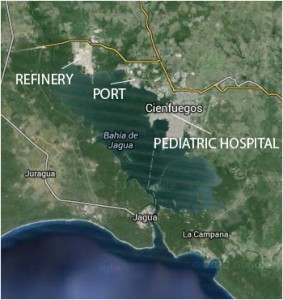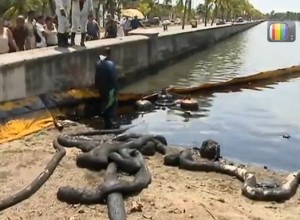 Cuba Standard
Cuba Standard
CUBA STANDARD — Putting to the test Cuban emergency response systems developed since the Deepwater Horizon disaster in the Gulf of Mexico three years ago, a fuel oil spill has affected Jagua Bay. The spill has been contained, official media reported Wednesday in a sparsely worded news item.
The fuel leaked into the bay from a boiler at a local pediatric hospital, according to AIN. The official report didn’t say what caused the spill, nor how much fuel oil ended up in the water. According to its postal address, the Hospital Provincial Pediátrico Paquito González Cueto is located near the historical center of Cienfuegos, nearly half a mile from the Bay.
It is too early to quantify the spill or assess the direct damage to sea fauna and flora, an official with the Ministry of Science, Technology and Environment (CITMA) said, according to AIN.
Jagua Bay — home to the Port of Cienfuegos and the island’s largest refinery, as well as an expanding cluster of petrochemical plants — is vulnerable to a major spill as supertankers frequently enter and exit the narrow mouth of the Bay, to unload crude. The Venezuelan-Cuban joint venture that operates the refinery has proposed an offshore supertanker terminal linking to the plant on the Bay via an undersea pipeline.
The emergency response at Jagua Bay involved various entities, including from the local refinery and CITMA. Experts from the Camilo Cienfuegos refinery, currently undergoing a billion-dollar expansion, used 200 meters of containment booms and oil-absorbing blankets to stop expansion of the oil film and prevent “dirtying of ship hulls,” AIN quoted a refinery specialist.
A pressure cleaning of the “grid” has diminished the quantity of fuel oil spilling into the Bay, the article said, without explaining what pipes were involved in the spill, why oil continues to leak, or what the responders did with the contaminated water from the cleaning. In a next step, the oil will be extracted from the Bay, “according to environmental regulations,” to then be “burned ecologically,” AIN quoted the expert. The CITMA official said that fuel oil that has already settled on the bottom of the Bay cannot be extracted.
The reports didn’t say what kind of fuel oil was involved.
According to AIN, this was the third emergency involving the boilers of the children’s hospital.
In the run-up of major offshore exploration projects and in response to the Deepwater Horizon disaster, Cuba has been assisted by experts from Venezuela and Brazil to create spill prevention and emergency response systems in offshore oil drilling.
 |
| The spill apparently affected an area close to the city center. Photo: 5 de Septiembre |
In 2010, Cienfuegos hosted an international oil safety conference. Presentations at that conference were about an early warning system, and a system the Cuban government was setting up to prevent and track spills. The Instituto de Oceanología de Cuba, which is part of CITMA, has developed a comprehensive oil spill information system. Other presentations at the conference were about the state of preparations in other high-risk operations such as thermoelectric power plants and ports, the role of Cuban fire fighters in disaster response, bio-remediation of spills, and liability issues.
No hay comentarios:
Publicar un comentario